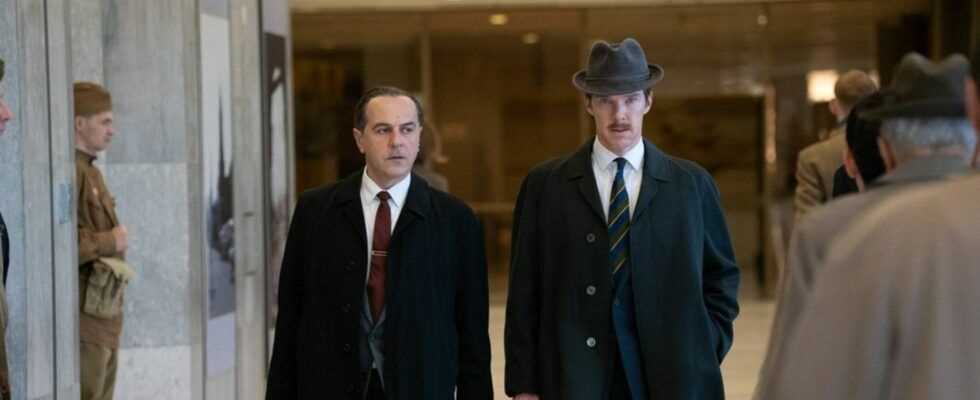“The spy”
Gripping story about an unusual alliance
Oleg Penkowski (left, Merab Ninidze) and Greville Wynne (Benedict Cumberbatch) pursue a common goal in “The Spy”.
© © Liam Daniel / Telepool
“The Spy” tells a compelling story from the Cold War. Benedict Cumberbatch excels as an amateur secret service agent.
During the hot phase of the Cold War, Western intelligence agencies recruit an ordinary British businessman to smuggle information into Britain from a former high-ranking officer in the Soviet Union. The story of “The Spy” sounds like the sensationally invented material of a Hollywood screenwriter, while the plot of the thriller by director Dominic Cooke (55) is based on real events. The gripping film lives from the grandiose interaction of the duo Benedict Cumberbatch (44, “Sherlock”) and Merab Ninidze (55, “Doktor Ballouz”) – and the story itself.
An unusual (and dangerous) friendship between East and West: the plot
In the early sixties the world is on the brink of nuclear war. Oleg Penkowski (Ninidze), a Soviet ex-officer with friends in the Kremlin, feeds the Western secret services with explosive information. In order to take him out of the immediate danger zone, the CIA and MI6 decide to provide him with an inconspicuous contact person. The choice falls on the Briton Greville Wynne (Cumberbatch), a businessman who has nothing to do with espionage and has to be convinced first. After the two befriends and Penkowski threatens to be exposed, Wynne tries to get him out of Moscow against the advice of the secret services.
In addition to Ninidze and Cumberbatch, Cooke’s work also features “The Marvelous Mrs. Maisel” star Rachel Brosnahan (30) as CIA agent Emily Donovan and Jessie Buckley (31, “The Miss Vote – The Beginning of a Revolution”) as Wynne’s wife Sheila of the lot. Both cut a good figure, even if Brosnahan’s performance seems a little pale next to that of their colleagues. This could be due to her role, which does not contribute much to the actual plot, which seems absolutely interchangeable and would probably have done without a top cast.
Cumberbatch and Ninidze act on an equal footing
As a “middle-aged businessman who drinks a little too much”, “Sherlock” Benedict Cumberbatch is once again in top form. After the drama “Inside Wikileaks – The Fifth Power” (2013), in which he portrays the Australian whistleblower Julian Assange (49), and “The Imitation Game – A Top Secret Life” (2014), he again plunged into the world of the secret service in an absolutely authentic way a. His role in the war drama “Imitation Game” is particularly similar to his current one, in which he also embodies a civilian – in this case a mathematician – who is hired by the British secret service.
A special dynamic, which captivates the viewer until the end, is created by Cumberbatch’s interaction with Merab Ninidze. As a Soviet traitor who wants to enlighten the West about Nikita Khrushchev’s (1894-1971) true motives and the danger he poses, the 55-year-old actor acts on equal terms with his colleague throughout the film. The fate of his tragic figure, who alone wants peace and in return puts her own life and that of his family in extreme danger, touches almost more than that of his British friend Greville Wynne.
But only almost. Because its story is also not lacking in tragedy, Wynne is made ice cold by a secret service to the plaything of the hardened fronts – regardless of personal losses, such as his already ailing marriage. In the end, one scene in particular symbolizes the bond between the two men, whose lives could hardly have been more different in their time: on the eve of their planned escape from Moscow, both sit next to each other in a ballet performance of Tchaikovsky’s “Swan Lake” – visibly tense and fearful Tears in the eyes.
Real background touches – and makes you think
The fact that the thriller captivates the audience almost from beginning to end is not only due to the outstanding actor duo Cumberbatch / Ninidze. The fact that the dramatic plot took place a good 60 years ago makes it tangible and should arouse strong emotions – especially in the generations who consciously perceived the Cold War, including the Cuban Missile Crisis, in 1962. The perfectly staged interplay of fictional recordings and original material, such as a live address by US President John F. Kennedy (1917-1963), skillfully intensifies this effect.
In the end, what touches most is the story of an unusual friendship between East and West shown in the film – at a time when such a friendship seemed almost unimaginable. For the big Hollywood cinema, the underlying real events were partially modified. The special relationship between the two family fathers Wynne and Penkowski, who each wanted to do only what was best for their country, is documented by Wynne’s autobiographies “The Man From Moscow” (1967) and “The Man From Odessa” (1981).
It is precisely these stories that deserve more space in a Hollywood that is often characterized by superficial blockbuster thunderstorms. Stories that show that even in difficult times people usually have more in common than different. You can make the audience think, “The Spy” is the proof.
